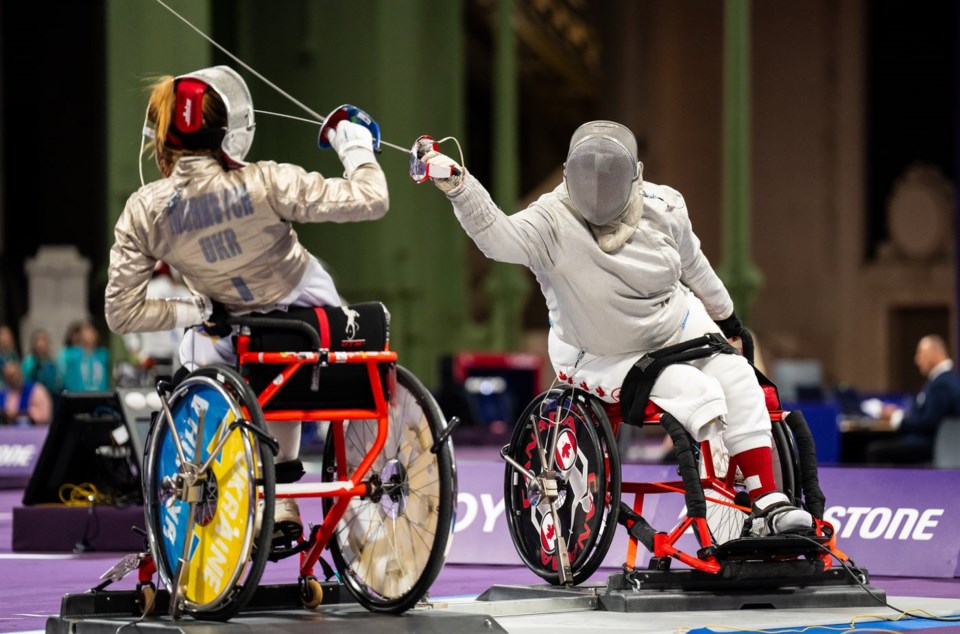PARIS — Canada's "grande dame" of wheelchair fencing wants more for her sport.
Ruth Sylvie Morel may have fenced her last Paralympic bout Tuesday in Paris, but the 68-year-old from Pincourt, Que., isn't done agitating to increase her sport's visibility.
Morel, known as Sylvie, represented Canada when wheelchair fencing made its Paralympic debut in Sydney, Australia in 2000. She competed in her fourth Games on Tuesday.
"Motivation, ambition, ego and plus, genetically, I'm lucky," was Morel's recipe for longevity in the sport.
"I don't feel my age, although now I'm lying because I got up this morning and the whole body aches.
"You just keep in shape. It's different now than with our mothers. I remember my mother at 60 and she didn't look like me."
Morel is the oldest athlete on the Canadian team in Paris as well as the oldest competitor in women's fencing.
She lost her sabre bout 15-1 to 2017 world champion Nataliia Morkvych, who is 32 years old.
"I took on the world champion Ukrainian girl and she basically gave me a free lesson," Morel said. "She was kind enough for me to get her at least once."
The sport is faster and more countries are involved than a quarter-century ago, she said.
In Sydney, Morel fenced in a gym. On Tuesday, she fenced in the Grand Palais.
"I wish all my competitions were like that," Morel said.
Morel isn't happy with the treatment of wheelchair fencing in Canada.
"Nothing is happening. Nobody is doing anything to develop wheelchair fencing and that kind of upsets me because that's my baby," she stated.
"I find that we're always pushed aside for the 'real' athletes. That upsets me a lot."
She ran a wheelchair fencing school for 15 years and currently coaches athletes.
Morel's teammate Trinity Lowthian of Ottawa was eliminated 15-14 by Brazil's Monica Santos in a first-round repechage match Tuesday.
The 22-year-old rarely competes in sabre and looked forward to her preferred weapon in Friday's épée.
"Really, today, for me, it's all about getting used to the environment before épée, which is the event I really focus on," Lowthian said.
Lowthian said Morel is a pioneer in more ways than one.
"She really started it from nothing," Lowthian said. "This is her chair that I'm fencing in from years ago. It's indestructible. So much I have is hand-me-downs from her.
"The path that she's paved ahead of me, even though it's been so hard with wheelchair fencing in Canada, because of her it's been that much easier. She's just really taught me to stand up for myself."
Saskatoon's Ryan Rousell defeated Brazil's Lenilson de Oliveira 15-4 in the first round of repechage but dropped his next match 15-5 to Italy's Edoardo Giordan.
"My movement was good, my actions were the right actions, it was just the wrong timing," the 27-year-old said after the loss.
"So it's just working on my timing and proper execution of the timing and most of the points probably would have gone my way."
Rousell, who will also compete in épée, found wheelchair fencing because of Morel.
"I was fencing able-bodied for roughly 16, 17 years and they brought her out to Regina in Saskatchewan to watch me fence in a tournament and we attempted to try wheelchair fencing," he explained. "She said I had a knack for it.
"She's done a lot for the fencing community. She's the one who pretty much started it all for most of us. She's the one who brought me into it and I plan to carry the torch onward."
Rousell's cerebral palsy affects muscles on the right side of his body. Lowthian has mobility issues from meningitis, which happened during her 2018 treatment for autoimmune neuropathy.
Morel no longer competes in épée because it causes bursitis in her arm.
She said Paris was her Paralympic swan song, but she hopes to return to the Games as a leader or support person for young fencers like Lowthian "because I do have 28 years of experience and knowledge," Morel pointed out.
She was injured in a car crash in 1993 and started wheelchair fencing three years later.
"When you get up one day and you're missing a leg, you don't feel 100 per cent like you were the day before," Morel said.
"Sports kind of made me valuable in the sense it didn't matter that I had a leg or not. I could do the sport. That kind of helped me that way."
This report by The Canadian Press was first published Sept. 3, 2024.
Donna Spencer, The Canadian Press



